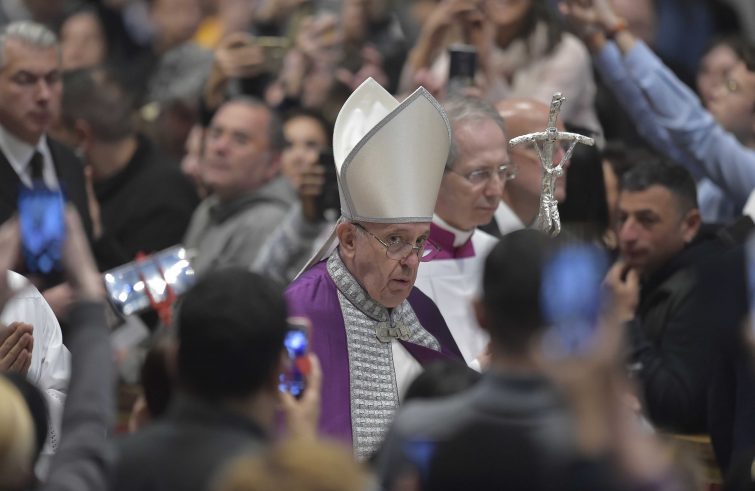
“We are experiencing a third world war fought piecemeal. Yet let us find the courage to see our world, not as being in its death throes but in a process of giving birth, not at the end but at the beginning of a great new chapter of history”: thus read the closing lines of Pope Francis’ Message for Lent 2024 released today, with the theme: “Through the Desert God Leads us to Freedom.” “When we feel hopeless”, we wander “through life like a desert and lacking a promised land as our destination”, read the opening remarks of the Pope’s Message. “The exodus from slavery to freedom is no abstract journey”, the Pope writes. “Today too, the cry of so many of our oppressed brothers and sisters rises to heaven. Let us ask ourselves: Do we hear that cry? Does it trouble us? Does it move us? All too many things keep us apart from each other, denying the fraternity that, from the beginning, binds us to one another.” Whence comes the topical relevance of the two questions posed by the Holy Father during his journey to the island of Lampedusa, concerning the “globalization of indifference.” “Where are you?” and “Where is your brother?”. “Our Lenten journey will be concrete if, by listening once more to those two questions, we realize that even today we remain under the rule of Pharaoh. A rule that makes us weary and indifferent”, Francis writes. “A model of growth that divides and robs us of a future. Earth, air and water are polluted, but so are our souls. True, Baptism has begun our process of liberation, yet there remains in us an inexplicable longing for slavery. A kind of attraction to the security of familiar things, to the detriment of our freedom.” “Do I want a new world? Am I ready to leave behind my compromises with the old?”, are some of the questions raised by the Pope:
“The witness of many of my brother bishops and a great number of those who work for peace and justice has increasingly convinced me that we need to combat a deficit of hope”,
For Francis, it “stifles dreams and the silent cry that reaches to heaven and moves the heart of God.” “It is not unlike the nostalgia for slavery that paralyzed Israel in the desert and prevented it from moving forward.
An exodus can be interrupted: how else can we explain the fact that humanity has arrived at the threshold of universal fraternity and at levels of scientific, technical, cultural, and juridical development capable of guaranteeing dignity to all, yet gropes about in the darkness of inequality and conflict.”
“God has not grown weary of us”, is Francis’ firm conviction, calling on the faithful to welcome Lent as “a season of conversion, a time of freedom.” “Unlike Pharaoh, God does not want subjects, but sons and daughters. The desert is the place where our freedom can mature in a personal decision not to fall back into slavery”, Francis points out, for “in Lent, we find new criteria of justice and a community with which we can press forward on a road not yet taken”, although it “entails a struggle”, against the “enemy and his lies.” “Even more to be feared than Pharaoh are the idols”, he warned: “To be all-powerful, to be looked up to by all, to domineer over others: every human being is aware of how deeply seductive that lie can be. It is a road well-travelled. We can become attached to money, to certain projects, ideas or goals, to our position, to a tradition, even to certain individuals. Instead of making us move forward, they paralyze us.”
“Yet there is also a new humanity, a people of the little ones and of the humble who have not yielded to the allure of the lie”,
the Pope writes in the Message: “Whereas those who serve idols become like them, mute, blind, deaf and immobile, the poor of spirit are open and ready: a silent force of good that heals and sustains the world.” “t is time to act, and in Lent, to act also means to pause”, the invitation: “To pause in prayer, in order to receive the word of God, to pause like the Samaritan in the presence of a wounded brother or sister. Love of God and love of neighbour are one love. Not to have other gods is to pause in the presence of God beside the flesh of our neighbour.” For this reason, prayer, almsgiving and fasting “are not three unrelated acts, but a single movement of openness and self-emptying, in which we cast out the idols that weigh us down, the attachments that imprison us.” “Then the atrophied and isolated heart will revive”, Francis assures: “In the presence of God, we become brothers and sisters, more sensitive to one another: in place of threats and enemies, we discover companions and fellow travellers.”
“The Church’s synodal form, which in these years we are rediscovering and cultivating, suggests that Lent is also a time of communitarian decisions, of decisions, small and large, that are counter-current. Decisions capable of altering the daily lives of individuals and entire neighbourhoods, such as the ways we acquire goods, care for creation, and strive to include those who go unseen or are looked down upon.”
It is the Pope’s proposal, as he invites every Christian community to to offer its members moments set aside to rethink their lifestyles, times to examine their presence in society and the contribution they make to its betterment.” “To the extent that this Lent becomes a time of conversion, an anxious humanity will notice a burst of creativity, a flash of new hope”, Francis assures, repeating to all what he told the young people at the WYD in Lisbon last summer: “Keep seeking and be ready to take risks. At this moment in time, we face enormous risks.”










